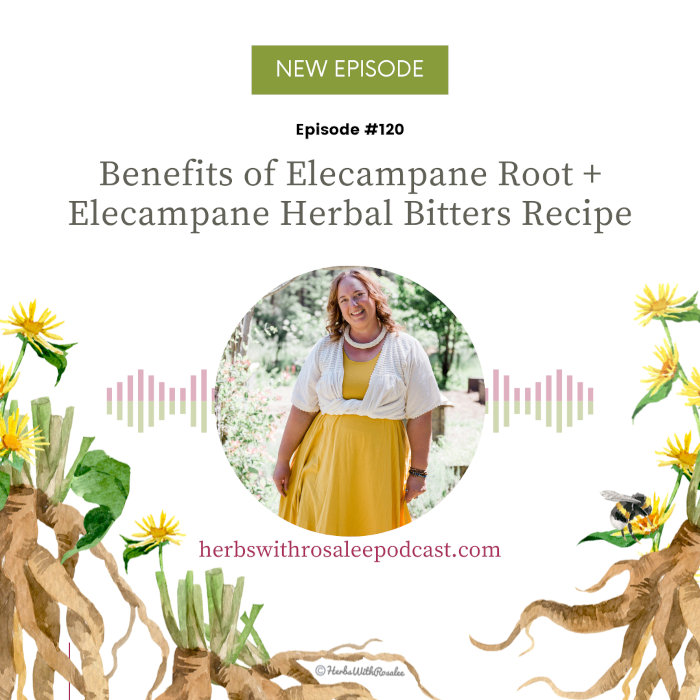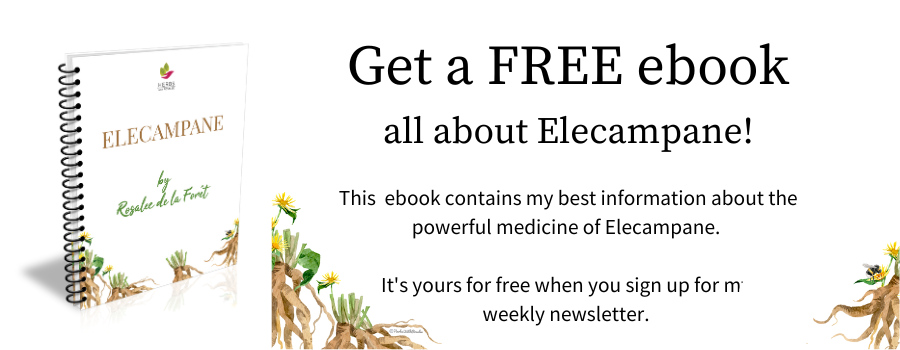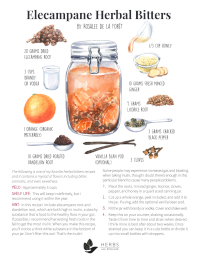Get weekly tips, recipes, and my Herbal Jumpstart e-course! Sign up for free today.
Episode 120:
Benefits of Elecampane Root + Elecampane Herbal Bitters Recipe
Share this! |
|

Would you prefer watching or reading this episode? If so, click here for the 'Elecampane Uses' video and transcript.
Episode Summary
There are so many benefits of elecampane root!
It’s famous for coughs but be warned: it doesn’t help ALL types of coughs. Instead, elecampane truly shines for one type of cough in particular (and yes, I’ve got all the details in the episode).
Elecampane root is also totally underrated as a bitter herb to support digestion.
In this episode, I’m sharing my love for this powerful medicinal plant. As a listener, you’ll also get access to my favorite elecampane herbal bitters recipe. (Be sure to download your free, beautifully illustrated recipe card!)
If you have elecampane in your garden, or you simply want to know how to use it, then don’t miss out on all my best tips for getting the most benefits of elecampane root!
After listening in, you’ll know:
► Why elecampane is not the herb to reach for when a cough has certain characteristics
► What type of digestive complaint elecampane can be especially helpful for
► Why elecampane can help you support a healthy gut flora (and how harvest time affects this)
► How to harvest elecampane root without killing the plant
► and much more
►►► To make it easy for you to keep this information organized, I’ve created a beautiful ebook as a companion to this episode. Receive your Elecampane ebook by signing up for my weekly newsletter below.

What You'll Learn from This Episode
- [01:10] Introduction to elecampane (Inula helenium)
- [03:14] Elecampane energetics
- [04:42] Elecampane: A famous cough remedy
- [09:38] Benefits of elecampane root for digestion
- [12:21] How to identify elecampane
- [13:25] Special considerations
- [14:13] How to work with elecampane
- [15:33] Elecampane herbal bitters recipe
- [18:22] How to use your digestive bitters
- [21:40] Herbal tidbit
Download Your Recipe Card!
The following is one of my favorite herbal bitters recipes and it contains a myriad of flavors including bitter, aromatic, and even sweetness.
The ingredients are:
- 20 grams dried elecampane root
- 10 grams dried roasted dandelion root
- 10 grams fresh minced ginger
- 5 grams licorice root
- 3 cloves
- 3 grams cracked black pepper
- 1/3 cup honey
- 1 orange (organic preferably)
- 1 vanilla bean pod (optional)
- roughly 3 cups brandy or vodka
To make this, place the roots, minced ginger, licorice, cloves, pepper, and honey in a quart sized jar.
Cut up a whole orange, peel included, and add it to the jar. If using, add the optional vanilla bean pod.
Fill the jar with brandy or vodka. Cover and shake well.
Keep this on your counter, shaking occasionally. Taste it from time to time and strain when desired. I think mine is best after about two weeks. Once strained you can keep it in a cute bottle or divide it up into small bottles with droppers.
This will keep indefinitely, but I recommend using it within the year.
l

Connect with Rosalee
- On Instagram | @rosaleedelaforet
- On Facebook | Herbs With Rosalee
- On YouTube | Herbs With Rosalee
- Website | herbswithrosalee.com
Resources Mentioned
- How to Use Herbs to Transform Your Health to get More Energy & Vitality – Without Expensive Supplements or a Restrictive Elimination Diet
- Herbal Jumpstart course
- Rooted Medicine Circle
- Wild Remedies: How to Forage Healing Foods and Craft Your Own Herbal Medicine
- Alchemy of Herbs: Transform Everyday Ingredients into Foods and Remedies That Heal

Rosalee is an herbalist and author of the bestselling book Alchemy of Herbs: Transform Everyday Ingredients Into Foods & Remedies That Healand co-author of the bestselling book Wild Remedies: How to Forage Healing Foods and Craft Your Own Herbal Medicine. She's a registered herbalist with the American Herbalist Guild and has taught thousands of students through her online courses. Read about how Rosalee went from having a terminal illness to being a bestselling author in her full story here.
comments